Community
Copyright@ Australian Catholic University 1998-2026 | ABN 15 050 192 660 CRICOS registered provider: 00004G | PRV12008
Copyright@ Australian Catholic University 1998-2026 | ABN 15 050 192 660 CRICOS registered provider: 00004G | PRV12008
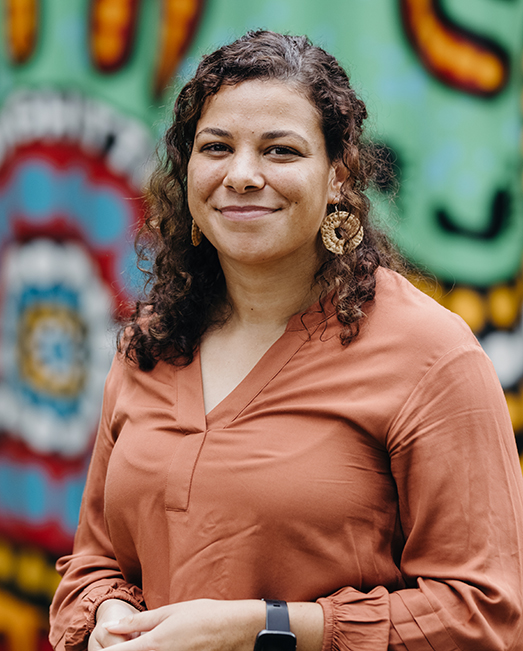
It was meant to be the year that Nicola Barker’s life got on track. In her first week at university in Canberra, she was full of optimism and anticipation for the year ahead. But things took a dramatic turn when a few sips of an energy drink triggered sudden cardiac arrest.
“I’d never in my life had an energy drink, and it just caused my heart to go off,” says Nicola, who was 19 at the time.
She was diagnosed with chronic heart failure, a condition she manages with medication and regular visits to a cardiologist.
While her heart is now doing well, her initial recovery was “a pretty tricky time, and not the best way to start university”.
“It was rough, especially for my dad,” says Nicola, now 28. “My mum died very young and so my dad was really worried about me, but it was just one of those unfortunate things you have to get through.”
Nicola is a Murawarii woman from Brewarrina, a remote NSW community with a large Aboriginal population, but she spent much of her childhood on Gumbaynggirr country in Coffs Harbour.
After years living in Canberra, where she completed a Bachelor of Social Work at ACU in 2018 and was employed as a social worker with the ACT Government, she moved back to Coffs when her family home was lost in a house fire.
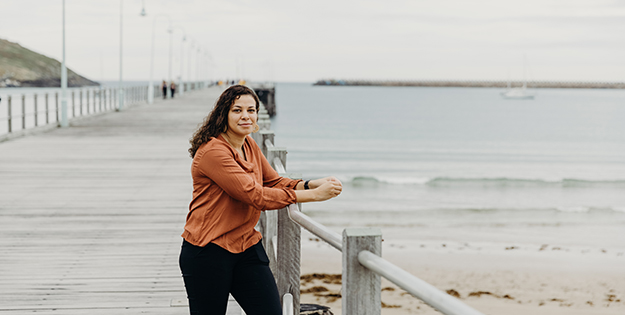
“I had a beautiful job in Canberra, doing great work with Aboriginal families and earning a good wage and all that sort of stuff, but that all changed when our house burned down at the end of 2019,” she says.
Nicola and her siblings pulled together and each made sacrifices for the good of the family.
“We lost everything, my dad was in hospital, and my teenage siblings needed support to rebuild their lives, so I was like, ‘Okay, I’ve got to come back’.”
Nicola spent her first year back at Coffs Harbour working as the Aboriginal Health Coordinator at the North Coast Primary Health Network, before landing her “dream job” with the Galambila Aboriginal Health Service – a clinic she attended as a client when she was younger.
While Galambila has served the Aboriginal community on the Mid North Coast for 20 years, Nicola is the service’s first-ever social worker.
“When I first started working here, one of the clinicians said, ‘How do I know you?’ And I was like, ‘Oh, you were my doctor when I was a little girl’,” she says.
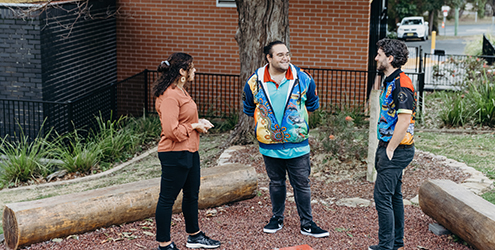
Nicola and colleagues.
“It’s really come full-circle. I was a client here and now I’m a clinician, working at empowering Aboriginal people in this region, helping them to build resilience and take their health into their own hands, and I really love this job.”
Social work is in Nicola Barker’s blood. Her parents were both community workers in Brewarrina and neighbouring Bourke, but her mother fell ill when Nicola was three. With no specialist or intensive care hospital in the local area, Nicola’s mother was moved six hours away to Dubbo to access the care she needed.
“My mother passed so suddenly that many of my family didn’t get to see her, as she was so far away,” she says.
“She was only 28, and I guess her death was one of the reasons I became interested in Aboriginal health and education and closing the gap.”
While Nicola maintained a strong connection to her Brewarrina community, her father moved the family to Coffs Harbour to give his children the opportunities that weren’t available out west.
At high school in Coffs, Nicola was the target of racial taunts from her classmates.
“There were many Aboriginal kids when we started high school and we’d get called names and things like that, and you might say, ‘Well, they’re just kids having a bit of fun’, but for us it wasn’t fun at all,” she says. “In our Year 12 class, we graduated with four Aboriginal students in my cohort.”
Buoyed by her ambition to go to university, Nicola shrugged off the racial insults and persisted with her studies. Even though she failed her HSC, she entered a university bridging course and went on to commence her bachelor’s degree.
As well as the schoolyard taunts, Nicola was conscious of systemic racism in the school curriculum, acknowledged as a major barrier to educational success for Aboriginal and Torres Strait Islander people.
“We would learn about things like Captain Cook founding Australia, and we’re sitting there as Aboriginal people thinking, ‘Our people have been here for thousands and thousands of years’,” she says.
It’s a sentiment echoed by many First Nations people, including rugby league great Johnathon Thurston, who has called for greater recognition of Aboriginal culture in the curriculum.
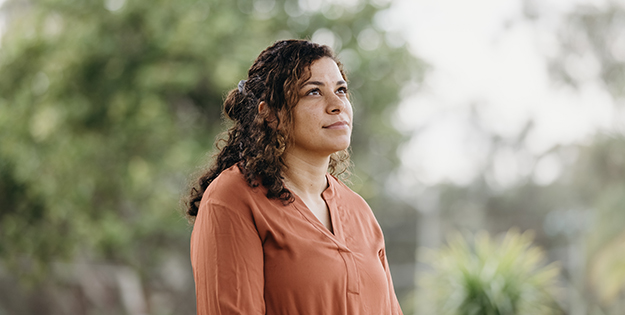
Nicola has been at the forefront of pushing for this change. She’s a co-founder of the National Indigenous Youth Education Coalition (NIYEC), an advocacy group that seeks to revolutionise Australia’s education system.
NIYEC launched the Learn Our Truth campaign, a movement that calls on school leaders and educators to build truth-telling into the national curriculum, incorporating Aboriginal and Torres Strait Islander histories and cultures.
In April 2021, the Australian Curriculum, Assessment and Reporting Authority announced changes to the curriculum to include a recognition of the true history of colonisation and invasion.
“I think the movement is incredible,” Nicola says. “To know that in the future, my kids, my nephews and nieces and all Aboriginal people will learn true Indigenous histories because of the work we’ve been advocating for, it’s one of my proudest moments.”
Nicola’s pathway to career happiness has been bumpy at times.
Through both high school and university, she’s juggled study with part-time and full-time work to support herself and her family.
After her sudden cardiac arrest, Nicola was in and out of hospital, spending months in recovery from five separate heart operations.
Through all of that, the memory of her mother got her through. Without the strength, support and guidance from close friends and family, including her “fierce and strong” grandmothers Maude Barker and Phyllis Smith, Nicola acknowledges that her accomplishments would perhaps not be achievable.
Meanwhile, her exposure to the harsh realities of life in a remote town sharpened her focus on the plight of her people.
The life expectancy of Indigenous people in remote communities is 65.9 years for men and 69.6 years for women – a staggering 14 years below the life expectancy of non-Indigenous Australians.
“Now that I’m at the age my mum was when she died, I’ve been reflecting on that a lot – about the things I’ve achieved that she didn’t have the chance to, because her time was cut so short,” Nicola says.
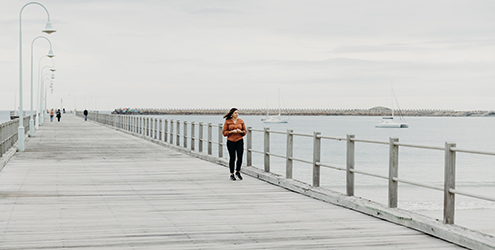
“You see people dying of diseases and illnesses that are preventable and treatable, and in many cases, it’s simply because they don't have the access to services out there.
“Growing up around that, knowing how unfair it was, it became clear that I wanted to work in a space where I could advocate for change, to make a difference to communities like mine so they can access quality healthcare and education.”
In 2015, Nicola transferred from her nursing degree and enrolled in a Bachelor of Social Work at ACU’s Canberra Campus. She has since notched up an impressive list of achievements.
Nicola was chosen as the First Nations youth advocate on a United Nations panel in New York, was named as Miss NAIDOC ACT for her work in Indigenous advocacy, and did an internship in Jinan, China with the Centre for Disease Control and Prevention. She has served as the chair of Indigenous Allied Health Australia’s student board, was featured in the Prime Minister’s celebration of Indigenous professionals, and was employed by the ACT Government to work in early intervention with Aboriginal and Torres Strait Islander children and their families.
These personal triumphs aside, Nicola’s eyes are set firmly on helping to bridge the divide between Indigenous and non-Indigenous Australians.
“We talk about closing the gap a lot, and we still don’t see it closing,” says Nicola, whose long-term goal is to set up a large-scale allied health centre in a rural community.
“Year after year, we see targets fail, but if we want to reach those targets, we first need to acknowledge the power imbalance that’s existed since colonisation, and we have to allow Aboriginal people to determine their own futures.
“We need to empower real self-determination, and we need the right people in the right spaces to make real change.”
Nicola is the winner of the Aboriginal and Torres Strait Islander Community Award in ACU’s Alumni Awards 2021.
Copyright@ Australian Catholic University 1998-2026 | ABN 15 050 192 660 CRICOS registered provider: 00004G | PRV12008